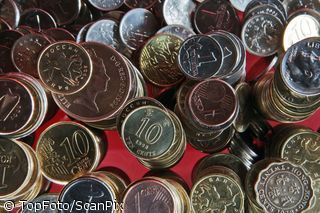It is the only source that can provide a chance for economic breakthrough
Published:
21 March 2005 y., Monday
Money from Russia’s Stabilisation Fund is expected to be invested abroad in dollar-nominated securities, with minimum investment risks and minimum profitability at 2-4%. These funds have until now been kept in Central Bank accounts. This means that a great deal of money will soon appear on the financial markets. On February 1, 2005, the Fund totaled 647.2 billion roubles ($23.1 billion), which mostly came from taxes on oil sales with prices exceeding $20 per barrel and export duties from oil companies.
The crucial question is how this money should be used. Money can only be taken out of the Fund when it has more than 500 billion roubles. Therefore, more than a fifth of its resources can already be used. This is a key issue for Russia’s economy, as the positive overseas market situation in recent years has been almost exclusively responsible for its growth.
However, experts are not tired of repeating that the potential of the resource-oriented Russian economy has been virtually exhausted. The mechanism whereby "we produce oil, sell it and enjoy the benefits" is becoming increasingly less effective. The country is now at a stage when it must introduce an industrial policy. However, any policy only makes sense when there is money to implement it.
Russia’s stock market and banking system do not provide the necessary financing for the real sector of the economy. Direct foreign investment in Russia remains at a very low level, while foreign investment in general is concentrated on either the import of equipment or foreign borrowings. The country obviously needs sources for further growth. The Stabilisation Fund is virtually the only potential source today and a genuine war is being waged for its funds.
Šaltinis:
financialexpress.com
Copying, publishing, announcing any information from the News.lt portal without written permission of News.lt editorial office is prohibited.
The most popular articles
 The European Commission today concluded on the existence of excessive deficits in Cyprus, Denmark and Finland and recommended deadlines for their correction to the Council.
more »
The European Commission today concluded on the existence of excessive deficits in Cyprus, Denmark and Finland and recommended deadlines for their correction to the Council.
more »
 Over 2000 former construction workers in Spain and nearly 600 ex-employees of Irish glass company Waterford Crystal and its suppliers will receive a total of €11 million in aid from the EU Globalisation Adjustment Fund to help with training, business start-ups and job guidance under plans agreed by MEPs and the Council of Ministers.
more »
Over 2000 former construction workers in Spain and nearly 600 ex-employees of Irish glass company Waterford Crystal and its suppliers will receive a total of €11 million in aid from the EU Globalisation Adjustment Fund to help with training, business start-ups and job guidance under plans agreed by MEPs and the Council of Ministers.
more »
 MEPs on Tuesday decided six top priorities and a number of additional key issues for the upcoming negotiations on the 2011 budget.
more »
MEPs on Tuesday decided six top priorities and a number of additional key issues for the upcoming negotiations on the 2011 budget.
more »
 The EU-China Science and Technology Week starts today at the heart of World Expo Shanghai.
more »
The EU-China Science and Technology Week starts today at the heart of World Expo Shanghai.
more »
 European Climate Action Commissioner Connie Hedegaard and European Investment Bank President Philippe Maystadt agreed on Monday to explore a joint climate finance initiative for developing countries as part of the European Union commitment made at the UN climate conference in Copenhagen last December.
more »
European Climate Action Commissioner Connie Hedegaard and European Investment Bank President Philippe Maystadt agreed on Monday to explore a joint climate finance initiative for developing countries as part of the European Union commitment made at the UN climate conference in Copenhagen last December.
more »
 Sustainability, competitiveness and security of energy supply: the three pillars to the foundation of a new EU energy community.
more »
Sustainability, competitiveness and security of energy supply: the three pillars to the foundation of a new EU energy community.
more »
 EU Trade Commissioner Karel De Gucht and Palestinian Minister of National Economy Hasan Abu-Libdeh today discussed measures to enhance EU-Palestinian bilateral trade relations and to facilitate trade of Palestinian products to EU markets.
more »
EU Trade Commissioner Karel De Gucht and Palestinian Minister of National Economy Hasan Abu-Libdeh today discussed measures to enhance EU-Palestinian bilateral trade relations and to facilitate trade of Palestinian products to EU markets.
more »
 Some of the most innovative and exciting transport research projects funded by the EU are being showcased at the Transport Research Arena (TRA) in Brussels this week.
more »
Some of the most innovative and exciting transport research projects funded by the EU are being showcased at the Transport Research Arena (TRA) in Brussels this week.
more »
 Nowadays we rely heavily on satellite positioning and navigation, but the only available technology is American.
more »
Nowadays we rely heavily on satellite positioning and navigation, but the only available technology is American.
more »
 The European Commission will reveal how it aims to revamp its transport networks policy in response to the challenges of the 21st century at a conference dedicated to the Trans-European Transport Network (TEN-T) in Zaragoza on 8 and 9 June.
more »
The European Commission will reveal how it aims to revamp its transport networks policy in response to the challenges of the 21st century at a conference dedicated to the Trans-European Transport Network (TEN-T) in Zaragoza on 8 and 9 June.
more »